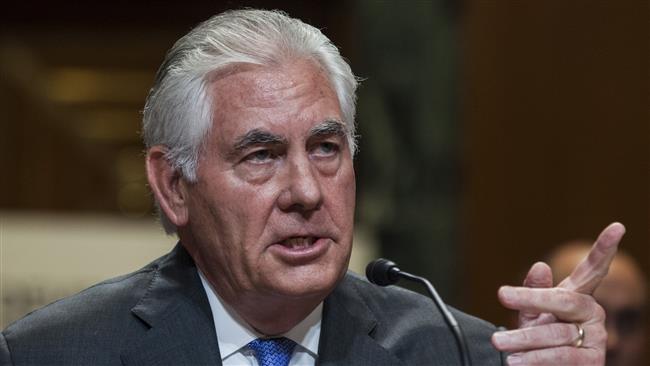
RNA - “We are either going to reform this thing and make it reflect what it should be reflecting or we will withdraw our support for it,” US Secretary of State Rex Tillerson told a House of Representatives’ Foreign Affairs Committee hearing on Wednesday.
He said Washington would replace the mechanism with “other means” over its intermittent critical reports on the regime’s activities in the occupied Palestinian territories in specific and against Palestinians in general.
In the event US withdrew from the UNHRC, Washington would “approach human rights issues on a multi-lateral basis with partners who see it the same way we do,” he added.
In March, the Council passed a series of anti-Israeli resolutions, including a motion condemning Israel for its illegal construction activities in Tel Aviv-occupied West Bank, East Jerusalem al-Quds, and the Golan Heights, which belongs to Syria, urging states and firms to avoid ties with Israeli settlements.
Last week, the UNHRC issued a report, which offered to “advise and support” efforts to create a “blacklist” database of the companies working with the settlements so the countries seeking to boycott them would know them.
Building on a threat
Also in March, the United States said it was considering ending its participation in the Council over the body’s “bias” and “obsession” with Israel. In a speech before the Geneva-based UNHRC, US envoy Erin Barclay said Washington “remains deeply troubled by the Council’s consistent unfair and unbalanced focus on…Israel.”
The United States is currently an elected member of the 47-state UNHRC, where its three-year term ends in 2019. According to the Council itself, any country wishing to revoke its membership would have to go through the General Assembly in New York.
The administration of US President Donald Trump is especially angry at a December resolution of the United Nations Security Council, which demanded Tel Aviv end illegal settlement activities in the occupied lands of Palestine.
Aiming for reports one by one
Earlier in the year, the UN Economic and Social Commission for Western Asia (ESCWA) published a report, accusing Israel of “apartheid.”
Rima Khalaf, the under-secretary general and executive secretary at ESCWA, subsequently resigned due to coercive measures used against her to withdraw the report. The world body finally withdrew the report under pressure from a drive spearheaded by Israel’s Ambassador to the UN Danny Danon and endorsed by Washington.
Most recently, however, ESCWA braved the prospects of renewed pressure by issuing another report accusing Israeli troops of using disproportionate force against Palestinians and in some cases of “extrajudicial executions.”
It said that Israeli forces had killed 63 Palestinians, including 19 children, and wounded an additional 2,276 Palestinians, including 562 children, between April 1, 2016 and March 31, 2017.
It also cited the UN Committee Against Torture and its concern about “Israeli practices towards Palestinian detainees,” and said “no criminal investigation was opened into more than 1,000 complaints of torture or ill-treatment filed since 2001.”
Danon said he would work to have the report removed, too.
847/940